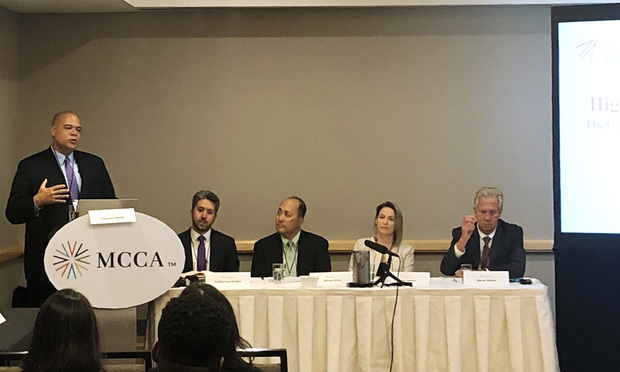Panel: Without Legalization, Banks Still Take Risk Accepting Cash From Cannabis Industry
Until marijuana is no longer a Schedule I drug under the Controlled Substances Act or exceptions to the law are passed, banks will still be taking a risk when it comes to providing financial services for cannabis companies, a panel at the Minority Corporate Counsel Association's 2019 Creating Pathways to Diversity Conference in New York said Wednesday.
October 16, 2019 at 02:25 PM
3 minute read
 (Left to Right): Charles Smith, vice president of enterprise anti-money laundering at Prudential Financial Inc.; Guillermo Artiles, partner at McCarter & English; Daniel Kim, assistant general counsel, global financial crimes legal at JPMorgan Chase & Co.; Gina Jones, chief financial crime officer at Equitable Holdings Inc.; and Steve Shine, vice president, corporate counsel at Prudential Financial Inc. at the Minority Corporate Counsel Association's 2019 Creating Pathways to Diversity Conference in New York on Wednesday. Photo: Daniel Clark/ALM
(Left to Right): Charles Smith, vice president of enterprise anti-money laundering at Prudential Financial Inc.; Guillermo Artiles, partner at McCarter & English; Daniel Kim, assistant general counsel, global financial crimes legal at JPMorgan Chase & Co.; Gina Jones, chief financial crime officer at Equitable Holdings Inc.; and Steve Shine, vice president, corporate counsel at Prudential Financial Inc. at the Minority Corporate Counsel Association's 2019 Creating Pathways to Diversity Conference in New York on Wednesday. Photo: Daniel Clark/ALM
Until marijuana is no longer a Schedule I drug under the Controlled Substances Act or exceptions to the federal law are passed, banks will still be taking a risk when it comes to providing financial services for cannabis companies, a panel at the Minority Corporate Counsel Association's 2019 Creating Pathways to Diversity Conference in New York said Wednesday.
Steve Shine, vice president and corporate counsel at Prudential Financial Inc., said without legislation protecting banks from criminal liability, the industry will remain a cash business.
"You're creating an economy that is separate and apart from the U.S. banking system," Shine said.
If federally regulated banks do choose to do business with cannabis companies or conduct business with companies that service the cannabis industry, they may still face federal criminal charges, Shine explained.
"Proceeds from the sale of marijuana—even though legal in certain states—it is proceeds of a crime under federal law," Shine said.
He said financial institutions that accept those proceeds could face money laundering charges, which is why many larger financial institutions have not agreed to work with cannabis companies or their contractors such as companies that provide packaging or build grow houses.
"We have those issues not just with the folks who touch the plant, but some of the related businesses," Shine said.
In 2013, the Cole Memo was published and written by then-attorney general James M. Cole. The memo said the Department of Justice was not going to spend resources prosecuting cannabis companies in states where it is legal. The Cole Memo was rescinded in 2018, by then-attorney general Jeff Sessions. However, Guillermo Artiles, a partner at McCarter & English in Newark, New Jersey, said on the panel that federal prosecutions of cannabis companies have decreased.
Many companies still operate under the spirit of the Cole Memo. However, the memo did not give banks the green light to accept proceeds from legal cannabis sales.
"It also didn't protect banks from federal banking regulators," Daniel Kim, assistant general counsel, global financial crimes legal at JPMorgan Chase & Co., said of the memo.
One of the bills that have passed the House and is pending in the Senate, Artiles said, is the Secure And Fair Enforcement Banking Act, or SAFE Banking Act. The legislation would provide a safe harbor for national banks and insurance companies to accept funds from cannabis companies, although it would not legalize marijuana at the federal level.
Artiles said he thinks if the bill passes in the Senate, President Donald Trump will sign it.
"He can comfortably say to his base that 'this wasn't a marijuana bill, this was a banking bill,'" Artiles said.
This content has been archived. It is available through our partners, LexisNexis® and Bloomberg Law.
To view this content, please continue to their sites.
Not a Lexis Subscriber?
Subscribe Now
Not a Bloomberg Law Subscriber?
Subscribe Now
NOT FOR REPRINT
© 2025 ALM Global, LLC, All Rights Reserved. Request academic re-use from www.copyright.com. All other uses, submit a request to [email protected]. For more information visit Asset & Logo Licensing.
You Might Like
View All
Exits Leave American Airlines, SiriusXM, Spotify Searching for New Legal Chiefs
2 minute read


After Botched Landing of United Airlines Boeing 767, Unlikely Plaintiff Sues Carrier
5 minute readTrending Stories
- 1Uber Files RICO Suit Against Plaintiff-Side Firms Alleging Fraudulent Injury Claims
- 2The Law Firm Disrupted: Scrutinizing the Elephant More Than the Mouse
- 3Inherent Diminished Value Damages Unavailable to 3rd-Party Claimants, Court Says
- 4Pa. Defense Firm Sued by Client Over Ex-Eagles Player's $43.5M Med Mal Win
- 5Losses Mount at Morris Manning, but Departing Ex-Chair Stays Bullish About His Old Firm's Future
Who Got The Work
J. Brugh Lower of Gibbons has entered an appearance for industrial equipment supplier Devco Corporation in a pending trademark infringement lawsuit. The suit, accusing the defendant of selling knock-off Graco products, was filed Dec. 18 in New Jersey District Court by Rivkin Radler on behalf of Graco Inc. and Graco Minnesota. The case, assigned to U.S. District Judge Zahid N. Quraishi, is 3:24-cv-11294, Graco Inc. et al v. Devco Corporation.
Who Got The Work
Rebecca Maller-Stein and Kent A. Yalowitz of Arnold & Porter Kaye Scholer have entered their appearances for Hanaco Venture Capital and its executives, Lior Prosor and David Frankel, in a pending securities lawsuit. The action, filed on Dec. 24 in New York Southern District Court by Zell, Aron & Co. on behalf of Goldeneye Advisors, accuses the defendants of negligently and fraudulently managing the plaintiff's $1 million investment. The case, assigned to U.S. District Judge Vernon S. Broderick, is 1:24-cv-09918, Goldeneye Advisors, LLC v. Hanaco Venture Capital, Ltd. et al.
Who Got The Work
Attorneys from A&O Shearman has stepped in as defense counsel for Toronto-Dominion Bank and other defendants in a pending securities class action. The suit, filed Dec. 11 in New York Southern District Court by Bleichmar Fonti & Auld, accuses the defendants of concealing the bank's 'pervasive' deficiencies in regards to its compliance with the Bank Secrecy Act and the quality of its anti-money laundering controls. The case, assigned to U.S. District Judge Arun Subramanian, is 1:24-cv-09445, Gonzalez v. The Toronto-Dominion Bank et al.
Who Got The Work
Crown Castle International, a Pennsylvania company providing shared communications infrastructure, has turned to Luke D. Wolf of Gordon Rees Scully Mansukhani to fend off a pending breach-of-contract lawsuit. The court action, filed Nov. 25 in Michigan Eastern District Court by Hooper Hathaway PC on behalf of The Town Residences LLC, accuses Crown Castle of failing to transfer approximately $30,000 in utility payments from T-Mobile in breach of a roof-top lease and assignment agreement. The case, assigned to U.S. District Judge Susan K. Declercq, is 2:24-cv-13131, The Town Residences LLC v. T-Mobile US, Inc. et al.
Who Got The Work
Wilfred P. Coronato and Daniel M. Schwartz of McCarter & English have stepped in as defense counsel to Electrolux Home Products Inc. in a pending product liability lawsuit. The court action, filed Nov. 26 in New York Eastern District Court by Poulos Lopiccolo PC and Nagel Rice LLP on behalf of David Stern, alleges that the defendant's refrigerators’ drawers and shelving repeatedly break and fall apart within months after purchase. The case, assigned to U.S. District Judge Joan M. Azrack, is 2:24-cv-08204, Stern v. Electrolux Home Products, Inc.
Featured Firms
Law Offices of Gary Martin Hays & Associates, P.C.
(470) 294-1674
Law Offices of Mark E. Salomone
(857) 444-6468
Smith & Hassler
(713) 739-1250






